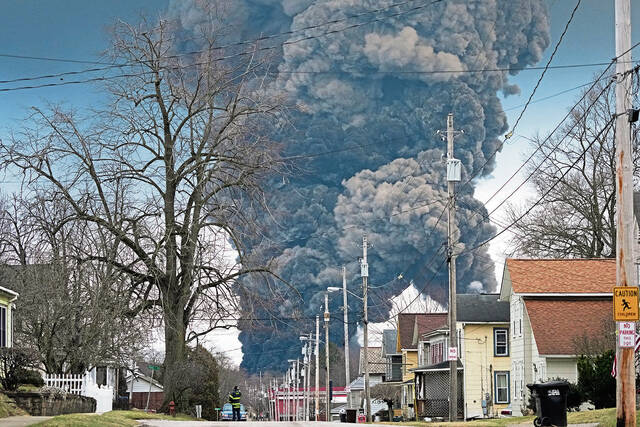When it comes to the environment, things can be a lot like the Reagan era saying about nuclear disarmament: trust but verify. Or sometimes distrust and verify.
You cannot always see the particles in the air that make taking a breath a danger. You cannot always taste what makes the water unsafe. For every smoggy sunset that makes low air quality obvious, there are the stealthy volatile organic compounds and carbon monoxide flying under the radar.
Those are the things that have to be sampled and tested. There have to be reports and analysis. Unchecked, the proof could be years in the making, coming in the form of health problems, ruined property and devastated economy.
That is why it is important to check the impacts of everyday environmental pressures and the emergencies alike.
Pennsylvania, Ohio and the federal government are all paying attention to the effects of the train crash in East Palestine, as they should. The Pennsylvania Department of Environmental Protection is testing water samples on the Keystone State side. The Environmental Protection Agency has ordered testing for dioxins. Carnegie Mellon University scientists are testing air quality, and while many numbers are showing low risk, at least one — acrolein — is outside of normal ranges.
These are attracting attention because of the scope and scale of the crash. But other crashes without skyscraper-high black smoke rising from intentionally burned vinyl chloride don’t pull the same scrutiny. There were 12 Norfolk Southern derailments in 2022 in Ohio alone.
This is why regular monitoring of air and water quality is important. It sets a baseline for what the concerns were before a disaster. It can find problems early and work to correct them before they are harder and more expensive to fix. It can also help to pinpoint responsibility.
With the announcement of the $458,000 fine levied against U.S. Steel by the Allegheny County Health Department for violations at the Clairton Coke Works or the DEP violations notice against the Shell cracker plant in Beaver County, the focus can sometimes seem punitive.
The demands of the crash should show the need for it as both proactive and protective.








